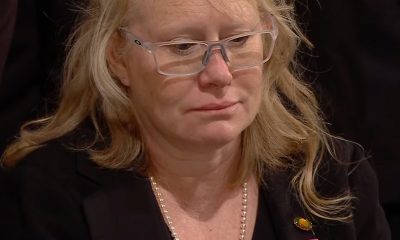Local
‘Straight Pride’ is a dangerous sham with tentacles of hate (UPDATED)
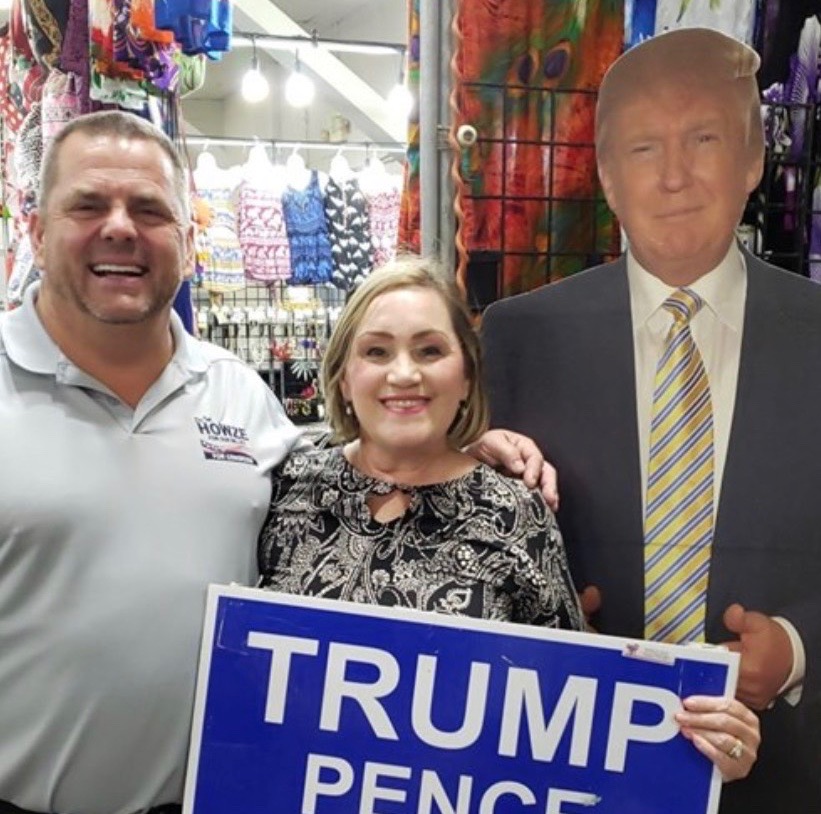
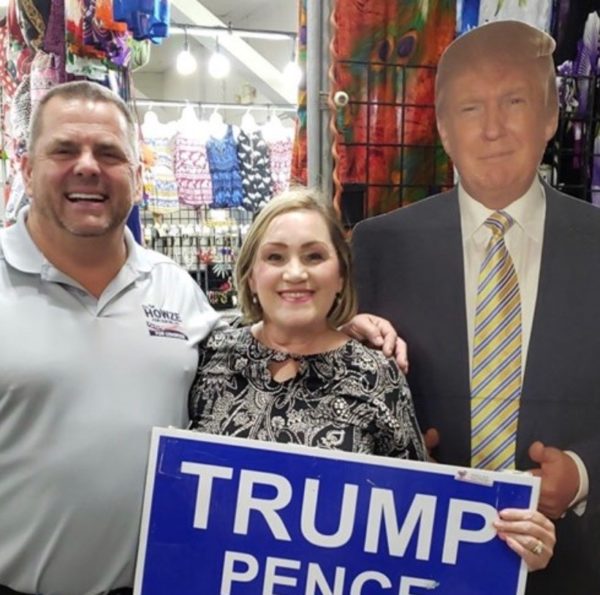
‘Straight Pride’ organizer Mylinda Mason with Republican candidate Ted Howze and cardboard Donald Trump. (Photo from Mason’s social media)
The FBI announced on Aug. 6 that it is launching a domestic terrorism investigation into the mass shooting at the Gilroy Garlic Festival after investigators discovered a list of other potential targets. On July 28, a 19-year-old gunman used an AK-47 style semiautomatic weapon to kill three and wound 13 others before turning the gun on himself.
There is no evidence that this mass shooting triggered others but six days later, on Aug. 3, a 21-year-old opened fire on mostly Latino back-to-school shoppers at a Walmart in El Paso, Texas, killing 22 and injuring 26 people. The following day, a 24-year-old gunman in Dayton, Ohio, killed 9 people, including his sister, and wounded 27 more.
Authorities are still trying to determine the motive for the shooting in Gilroy but investigators discovered he was exploring violent ideologies.
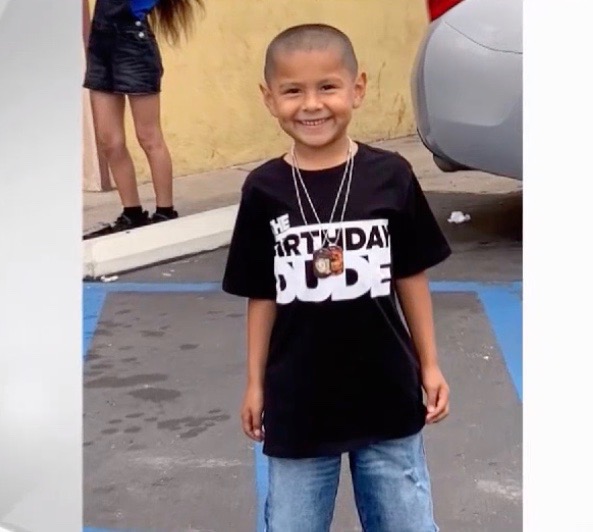
6 year old Steven Romero was shot in the back and died at the Gilroy Garlic Festival (Photo courtesy his father)
“There’s a whole cadre of extremists whose goal is really about bringing society to its knees. Violence is not just a means to promote an ideology. It’s become an ideology itself,” Brian Levin, director of California State University, San Bernardino’s Center for the Study of Hate and Extremism, told USA Today.
Fredrick Brennan founded the Internet fringe message board 8chan where three mass shooters blamed for killing 74 people this year—including the Gilroy gunman—posted their screeds. He told NBC News that the new owner gives “constant nods and winks to the radical, neo-Nazi part of their user base” where they enjoy infamy. Hours after the El Paso attack, he said, administrators kept the tagline “Embrace infamy” on 8chan’s front page.
The Southern Poverty Law Center has identified 83 hate groups in California. But keeping track of lone wolf white supremacists and angry young white men radicalized on 8chan and other sites is beyond difficult.
Gilroy is about 54 miles from Modesto where San Jose-based Don Grundmann, head of the National Straight Pride Coalition, and Modesto resident Mylinda Mason, who “manages” the old Tea Party-ish California Republican Assembly for Stanislaus County, want to mount a “straight pride” rally on Aug. 24 in Graceada Park.
The organization’s flyer, bordered with pink, says: “Join us to celebrate heterosexuality, masculinity, feminity, babies – born and unborn – western civilization, our wonderful country, Christianity — Celebrate Life!”
“Essentially it boils down to two religious views of the world,” Grundmann told CBS13, the Sacramento affiliate. “One is Christianity, which is represented by heterosexuality, a culture of life, and its opponent is the LGBT movement, which is represented by an opposing religion and an opposing view of life.”
“We’ve been getting letters, emails, comments, and phone calls all day about it,” said Modesto City Council member Kristi Ah You. “I don’t think we need to give a permit for anything that when you go to the page it talks about whiteness, it talks about western civilization, it talks about being Caucasian. That’s all hate crime stuff to me, that’s not okay.”
Ah You said she supports free speech and first amendment rights, for which the “straight pride” organizers are asking. “I think if we ignored it and let the people do whatever they’re going to do, I think maybe four or five people would show up.”
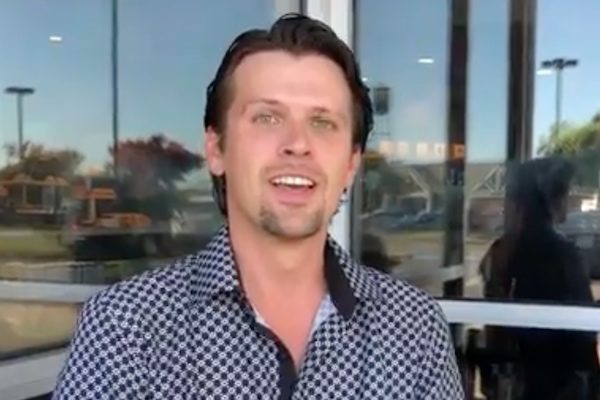
That was before Matthew Mason, 28, the adopted and estranged gay son of rally organizer Mylinda Mason, alerted the press.
“This isn’t ‘straight pride.’ This is hate pride,” said Matthew Mason told Fox40 in Modesto. “Dog whistling to white supremacy, that is immediately inciting violence. I am afraid of violence happening. I don’t want anyone in my community to be hurt.”
Mylinda Mason said the rally would be a peaceful gathering. “They’re looking to amp it up into something that it’s not,” she told Fox40. “It’s really going to be much more like on the purview of a church service really. It really is just celebrating our beautiful country.” Everyone is welcome, even LGBTQ people, adding “the intolerance doesn’t come from [their] side.”
That’s the cover. Hate mongers no longer need to be slathered in tattoos listening to angry heavy metal bands. As last year’s Frontline/ProPublica series on the new American Nazis shows, the look now is often khaki pants and blue shirt to fit into the mainstream, until they can let down their guard and don masks as do both the national neo-Nazi group Atomwaffen Division, which apparently inspired Samuel Lincoln Woodward, 21, of Newport Beach to murder his former gay Jewish high school classmate Blaze Bernstein. The Orange County-based Rise Above Movement, a white supremacist group, saw four members arrested Oct. 2, 2018 on federal charges for allegedly traveling to Virginia with the intent to incite a riot at the deadly far-right rallies in Charlottesville.
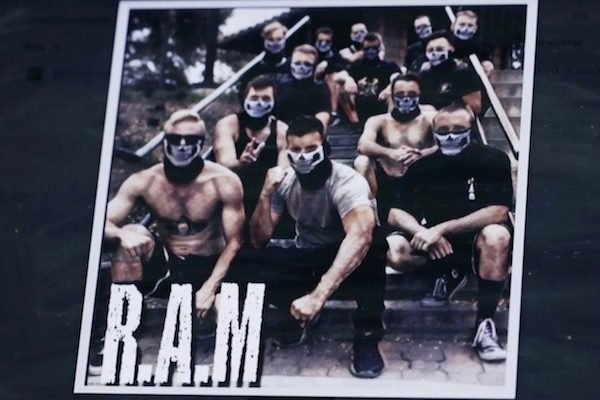
“Inspired by the writings of Hitler and the idea of ‘white jihad,’ members of groups like R.A.M. and Proud Boys don’t need much provocation to become violent. Indeed, members of Atomwaffen Division have been charged in five killings over the past two years,” former Nazi Christian Picciolini wrote in an op-ed in the Los Angeles Times. “It is true that the leaders of such groups draw in disillusioned young men who believe the world has sidelined them. But just because their members look familiar to many Americans does not make them less dangerous. Their violence is part of a growing pattern of domestic terrorism and should not be excused as an adolescent blip.”
While Mylinda Mason says the “straight pride” rally will be church-like, the National Straight Pride Coalition website opens with a note to “Dear Citizen” then reads: “The purpose of the California Straight Pride Coalition is to defend the children noted above. This is inclusive of preventing the current and future generations of all races and colors from being destroyed by the inherent malevolence of the Homosexual Movement toward our founding principles below.”
One of those principles describes “Caucasians” as “the biological majority of the historical developers and founders of Western Civilization.”
That’s not a dog-whistle. That’s a clarion call to anti-LGBTQ white supremacists everywhere, including hate group-inspired lone wolfs.
The fear increased when word went out that Grundmann had joined the local chapter of the Proud Boys, designated a California hate group by the Southern Poverty Law Center, and invited the boys to attend the rally.
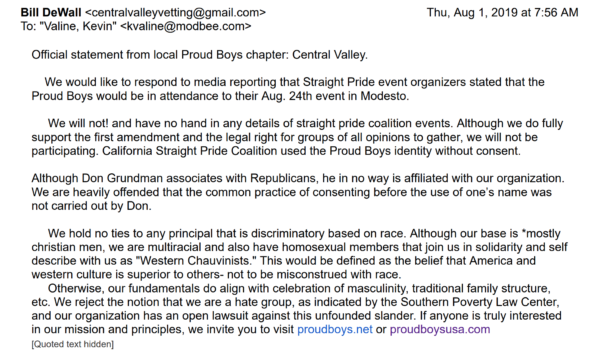
But the Proud Boys told the Modesto Bee they were not attending and were annoyed that Grundmann had used their name for publicity purposes without permission.
Modesto City Council members got an earful from “dozens of people” Aug. 7, the Modesto Bee reported. Grundmann was booed and got into a shouting match until Mayor Ted Brandvold restored order.
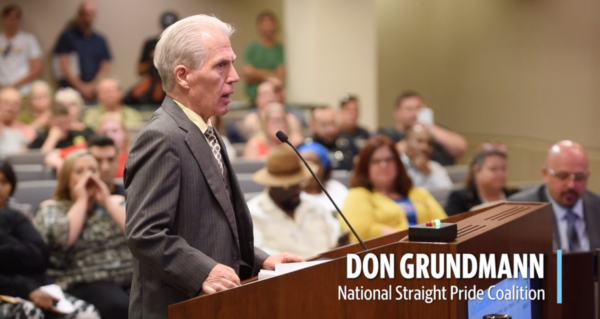
“And audience members howled, cheered and clapped when Grundmann called his group a ‘peaceful, racist organization,’ though he took that comment back, saying he had misspoke,” the Bee reported.
City spokesperson Thomas Reeves told the Los Angeles Blade that the “straight pride” rally was not on the agenda and it is actually up to staff to approve the organization’s application to reserve the Graceada Park amphitheater, Mancini Bowl, for Aug. 24, based on factors such as insurance compliance.
Reeves says the city is “very sensitive to everything that is happening across the country” and will “ensure the safety of our community,” preparing for anything.
Reeves thinks the decision to grant the reservation is imminent.
(UPDATE FRIDAY 7:00PM) The application was denied for use of the park, according to the Modesto Bee, but staff proposed an alternate site—”the plaza by Modesto Center Plaza, the city’s downtown convention, provided organizers submit an application by Tuesday, including proof of insurance.” If the organizers do not make the Tuesday deadline, they could apply again for a later date.
Nonetheless, many people are still afraid of what might happen if the application is granted.
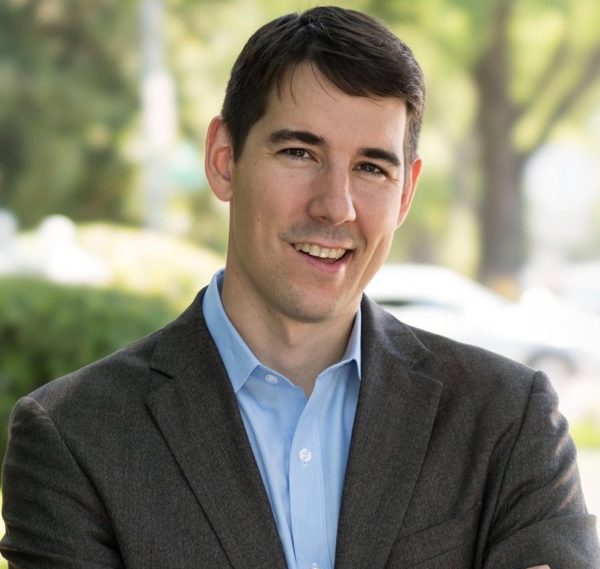
The message, Democratic Rep. Josh Harder tells the Los Angeles Blade, is “intended to send a signal of bigotry and hatred and discrimination against not just our LGBTQ community, but they also included in their manifesto things like looking for a return to so-called white civilization. And so I think it’s very clear that this event is racist, bigoted, and has absolutely no place in the Central Valley.
“I’m very concerned,” says Harder. “We’ve known for a long time that there are certainly folks who practice hate who live here just like they live anywhere else. One of the people, unfortunately, who was one of the organizers of Charlottesville, lives in Oakdale. And so I think we’re very concerned about where could this lead to. I think what we’ve seen across our country in the last year or two is that hatred and bigotry often lead to violence.”
However, he says, “the valley is one of the most diverse places on the planet. We are a majority minority area. We are a land of immigrants – that is our social and economic fabric. And so the racism and the anti-LGBTQ bigotry that this event represents, I believe is deeply counter to the values that we hold.”
Harder’s victory over his Republican opponent was a slim win and while the district may be bluish, it could also revert to red. The “straight pride” rally may help voters make that decision. Harder’s Republican opponent is Dr. Ted Howze, a local veterinarian, who is strongly supported by the CRA’S Mylinda Mason – and local Proud Boy Travis Hewes.
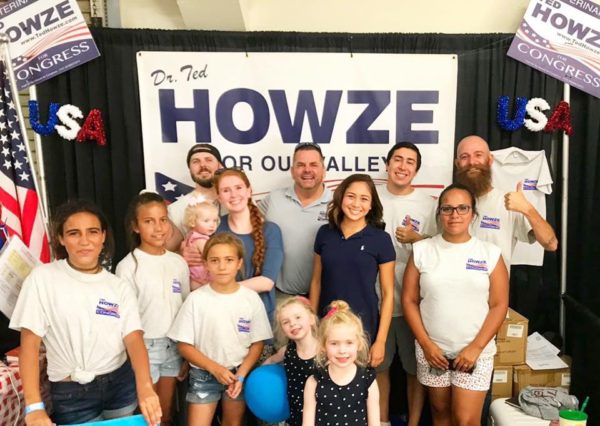
Dr. Ted Howze, center, with local Proud Boy Travis Hewes, far right with beard.
“While fully supporting the right of free speech and equal rights for all members of our community, I believe that events which solely focus on highlighting differences from one another are unnecessary and potentially damaging to community spirit,” Howze told the Los Angeles Blade in an email. “I choose to focus on the things we all share in common and striving to improve the daily quality of life for Valley residents.”
Asked about the photo of him with a Proud Boy campaign volunteer, Howze said “I’ve taken pictures with thousands of members of the local community and obviously don’t know each individual’s personal convictions. I detest racism, homophobia & xenophobia.”
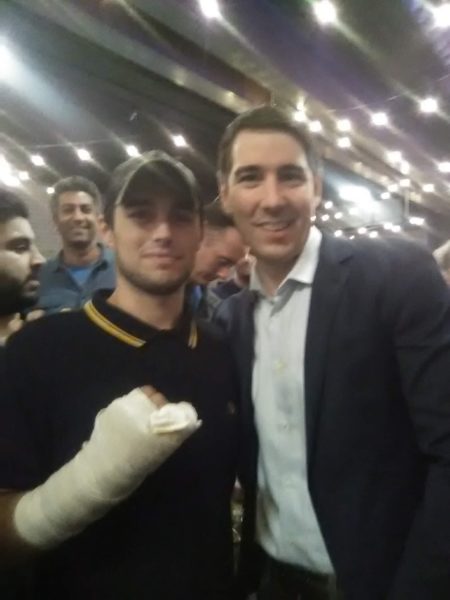
Josh Harder with a young man Ted Howze identifies as a Proud Boy (Photo via Howze)
Howze noted that Harder had also been recently criticized “for taking a picture with a ‘Proud Boy’ at his election night party. Hopefully the politics of condemnation doesn’t rest on who politicians unknowingly have a picture taken with and personal views we are unaware of?”
Given the painful aftermath of the mass shootings in Gilmore, El Paso and Dayton, Howze’s loyalty to Donald Trump and Mylinda Mason may have greater political ripple effects than dodging the complexities of hate associated with his supporter’s “straight pride.”
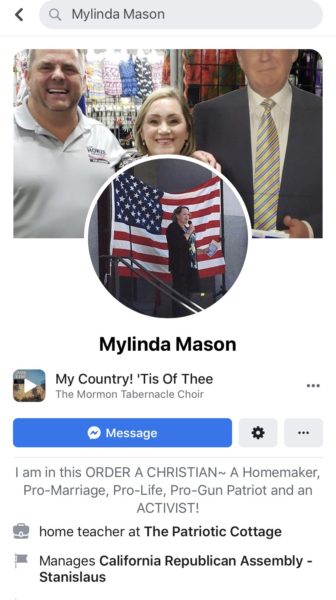
Additionally, no one has yet asked Mason’s boss about what he thinks of her hate-inspiring crusade. She identifies herself as a “home teacher at The Patriotic Cottage,” apparently America’s most patriotic golf club” that supports a non-profit called Folds of Honor.
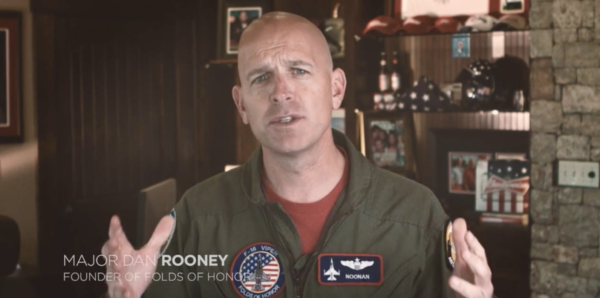
The charitable organization was founded by Top Gun pilot Major Dan Rooney who had an epiphany about the need to provide “educational scholarships to the children and spouses of military service men and women killed or disabled while serving our great nation. Of the one million-plus dependents adversely affected by deployments to Iraq and Afghanistan, over 87% do not qualify for federal scholarship assistance,” according to the Folds of Honor website.

Rooney has hosted compassionate conservative President George W. Bush at his golf club to draw attention to the scholarship program. What will other compassionate conservative contributors think when they discover Folds of Honor employs a teacher who is an organizer of hate?
Los Angeles
Trans and nonbinary immigrants experience greater levels of poverty, new report finds
A recent study looks into the disproportionate rates of homelessness and poverty trans and nonbinary immigrants face in L.A.
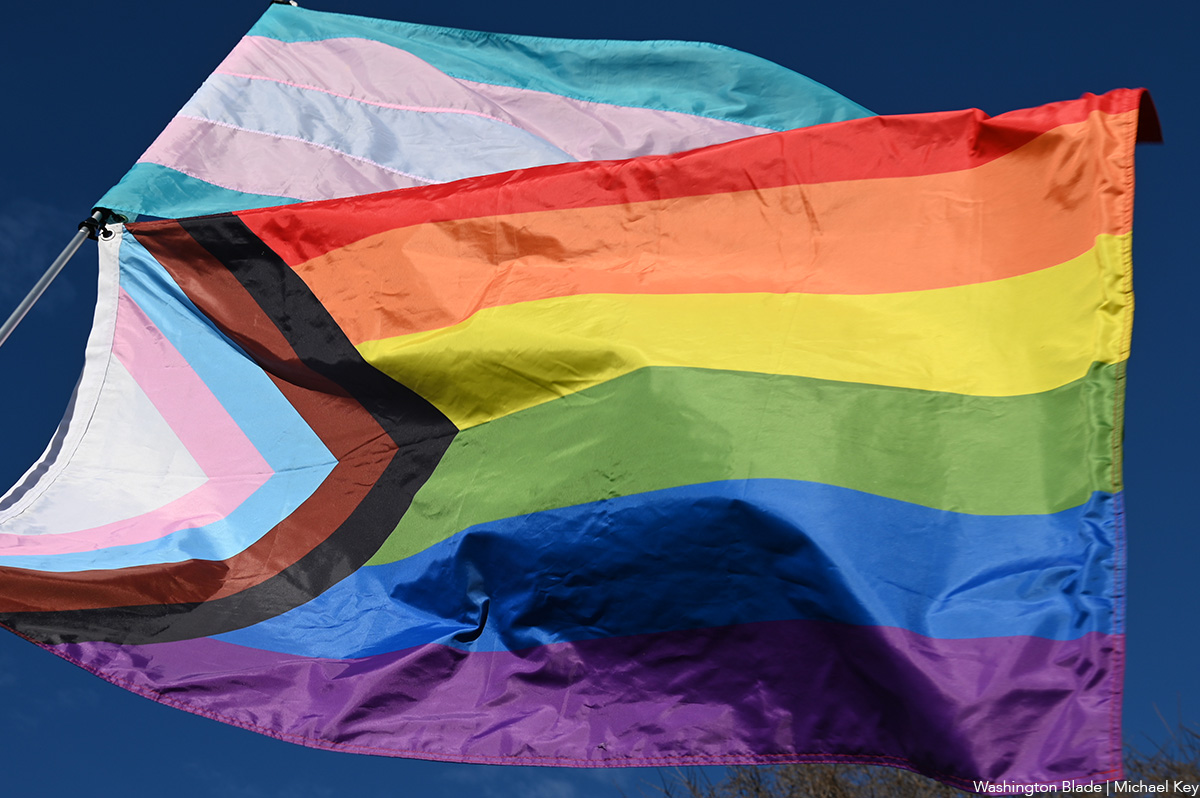
In a new report published by the Williams Institute, a local research center focused on conducting studies around LGBTQ+ communities and public policy, analysts reviewed data from the 2023-2024 L.A. County Trans and Nonbinary Survey and concluded that transgender and nonbinary immigrants face significantly greater rates of unemployment and homelessness than trans and nonbinary Angelinos who are not immigrants.
Created in partnership with the TransLatin@ Coalition (TLC), an organization that works to defend and advance the rights of trans, gender-expansive, and intersex (TGI) community members, and co-authored by TLC president Bamby Salcedo, the report looks more deeply into the 98 trans and nonbinary immigrants surveyed from a broader pool of 322 respondents in the initial 2023-2024 survey.
What were the key findings?
73% of the trans and nonbinary immigrants — and 80% of trans Latine immigrants — who were surveyed live at or below the federal poverty level, compared to 44% of trans and nonbinary non-immigrants surveyed. These numbers are not meant to pit these communities against one another, but rather to highlight the disproportionate amounts of poverty that trans and nonbinary people of color and immigrants face in the city.
39% of the trans and nonbinary immigrants polled also reported being unhoused, compared to 19% of the non-immigrant participants. 47% of the immigrant participants reported that they were unemployed, compared to 22% of non-immigrant participants.
Another wide discrepancy is revealed in access to educational resources. 30% of the TGI immigrant respondents, including 41% of TGI Latine immigrants, reported having less than a high school or GED level of education, compared to 8% of non-immigrants. Nearly half of the trans and nonbinary immigrants surveyed reported that they were unemployed, and 30% reported that they lacked health insurance and thus delayed seeking necessary medical care over the last year.
“It is essential that these communities are included in county-wide problem-solving and policymaking,” said Salcedo, in a press release about the study. Last month, the Blade reported on the TLC’s launch of its TGI: Housing Initiative, a campaign that would allow the organization to work with the county’s affordable housing solutions agency, LACAHSA, to invest funds into homelessness prevention resources for transgender, gender-expansive, and intersex community members. TLC members advocated for the initiative at LACAHSA’s board meeting on Sept. 17th. There have yet to be updates on whether or not the agency will support the initiative.
Another related Williams Institute report is set to be published later this month.
West Hollywood
West Hollywood officially welcomes a new transitional housing program
The Holloway Interim Housing Program provides 20 rooms for chronically unhoused individuals
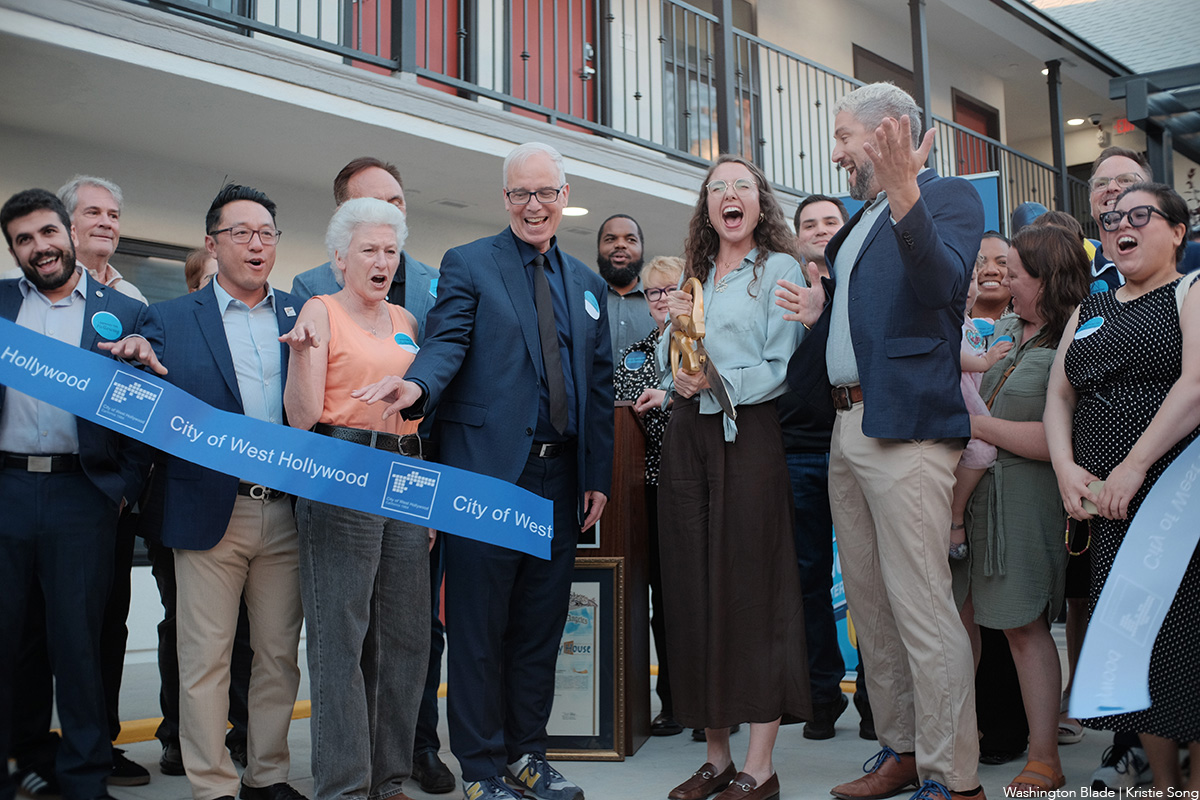
On Tuesday evening, hearty crowds mingled in the courtyard of the old Holloway Motel, buzzing with excitement as West Hollywood mayor Chelsea Byers took the podium. All gathered for the ribbon-cutting ceremony and an open house preview of the Holloway Interim Housing Program, the city of West Hollywood’s latest step in its five-year plan to address chronic homelessness.
In 2022, West Hollywood received a Homekey grant of $6 million from the California Department of Housing and Community Development and purchased the property at Holloway Drive the following year, with plans to revitalize the space into a supportive facility for unhoused community members. After years of development, the Holloway Interim Housing Program is ready to open. The city is partnering with Ascencia, a nonprofit that provides services to unhoused individuals and families, which will manage daily operations at the facility and provide direct support to residents.
“This program is not just short-term housing. It’s a stepping stone towards housing, health, and stability for the long haul,” said Byers, addressing attendees. “This project is what happens when a city puts its values into action. The Holloway is a safe haven and a second chance. It’s a promise kept.” Wielding large golden scissors, Byers cut the ribbon to signal the start of the program, smiling elatedly while surrounded by fellow councilmembers and staff.
The Holloway Interim Housing Program holds 20 private rooms, and residents will be allowed to stay for up to 90 days. As of now, program participants have to be referred by local homelessness service providers and outreach teams to be able to stay at the premises. During this time, they are connected with case managers and will receive counseling and support on healthcare, employment readiness, and pathways into securing permanent housing. Meals will be provided, and community spaces will also be available for residents to engage in workshops, recovery groups, and other communal programming together.
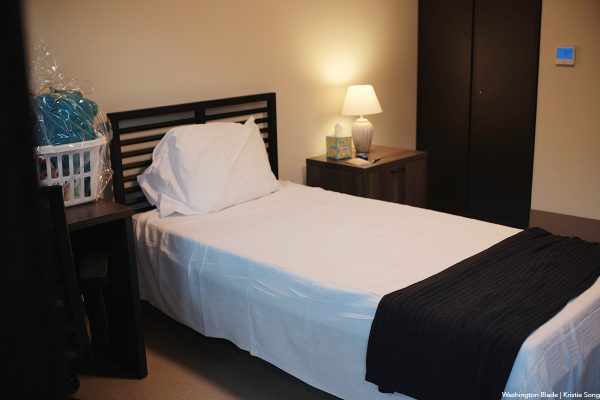
“We have communities that basically respond to the homeless crisis by moving the problem to someplace else,” said California Assemblymember Rick Chavez Zbur, who was also present at the ceremony and open house. “Really, without transitional supportive housing, we don’t provide opportunities for people to move into long-term housing, and that is a key part of the building block that is underfunded and under-invested in.”
When will the program officially welcome its first group of residents? This upcoming Monday, on Oct. 6th, Ascencia Director of Programs Marcell Mitchell told the Blade. Mitchell also explained that Ascencia hopes to keep the program at full capacity. When residents are leaving, someone else from their waiting list will be contacted to fill the space. “We’re ready to get going. We’re ready to start helping people,” Mitchell continued. “It’s definitely a good first step forward. We’ll be able to help people in the community where they’re at, get them going, and get them back to their normal lives.”
California
Congress members, public health organizations urge Governor Newsom to sign bill amidst threats to PrEP access
Two letters have been sent to the governor, calling on him to sign AB 554 into law by October 12th
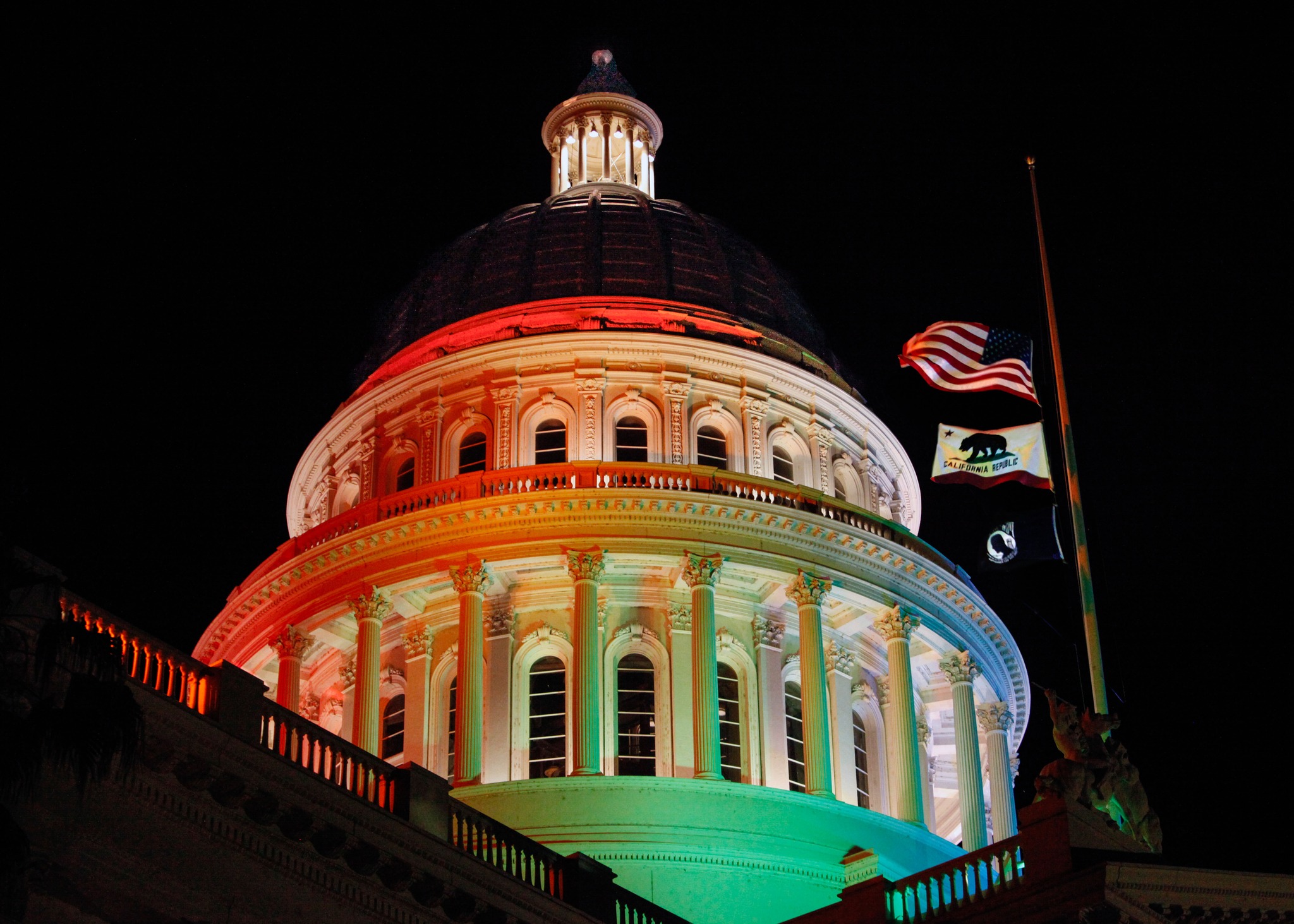
On September 24th, 13 Congress members penned a letter to the governor, asking him to sign AB 554 — or the PrEPARE Act of 2025 — into law. If passed, the bill would strengthen existing state laws around health insurance coverage and access to preventative medication for individuals affected by HIV/AIDS.
AB 554 would require health plans and insurers to cover all FDA-approved PrEP medications, including injectable forms, without prior authorization or step therapy. The bill’s co-authors and supporters emphasize the need to bolster support for impacted individuals and communities, ensuring that they can access effective treatment plans with as few systemic barriers as possible. The bill also includes protections for community clinics, so that they are reimbursed promptly and able to provide medication for impacted people.
In this letter, co-signed by local elected officials including District 42 Representative Robert Garcia, District 43 Representative Maxine Waters, and District 34 Representative Jimmy Gomez, the coalition of Congress members cites a number of reasons for this call to action.
Namely, they state that the Department of Health and Human Services Secretary Robert F. Kennedy, Jr.’s reported desire to oust all members of the U.S. Preventive Services Task Force — an independent panel of disease prevention experts that provides recommendations to insurance companies, doctors, and other health professionals — is a move that “risks reversing decades of progress in the fight against HIV, one of the most devastating epidemics in history.”
They also write in the letter that insurance cost-sharing restrictions are especially harmful towards Black and Latine communities, who “accounted for over 70% of new HIV diagnoses [in the state] yet remain significantly underrepresented among PrEP users compared to their White counterparts.”
In a separate letter addressed on September 25th, over 90 advocacy groups and public health organizations similarly stressed the importance of AB 554 to the governor. Here, they discussed CVS Health’s decision to not approve coverage for Yeztugo, the first twice-yearly injectable PrEP medication, even though it was approved by the FDA in June.
The organizations that have signed on include LGBTQ+ civil rights organization Equality California, as well as resource outreach groups such as the AIDS Healthcare Foundation and the California LGBTQ Health & Human Services Network. They write that CVS’s “dangerous decision underscores the urgent need for additional clarity in state law to ensure that all FDA-approved PrEP medications are covered without cost-sharing, guaranteeing that lifesaving innovations are available to Californians without delay.”
The letters highlight a need to address equity and accessibility for those impacted by HIV/AIDS, specifically those who belong to marginalized communities. AB 554 received a majority vote of support by both the California State Assembly and Senate on September 10th, and now waits in limbo for Governor Newsom’s signature. He has until October 12th to sign or veto the bill.
In the meantime, Equality California encourages community members to visit their website to learn more about the bill, other pending LGBTQ+ state legislation, and how they can support these movements.
Los Angeles County
New direct cash program aims to prevent youth homelessness in Los Angeles County
CASH LA launches as the first youth-focused direct cash assistance program in Los Angeles to prevent homelessness among LGBTQ+ young people and youth of color.
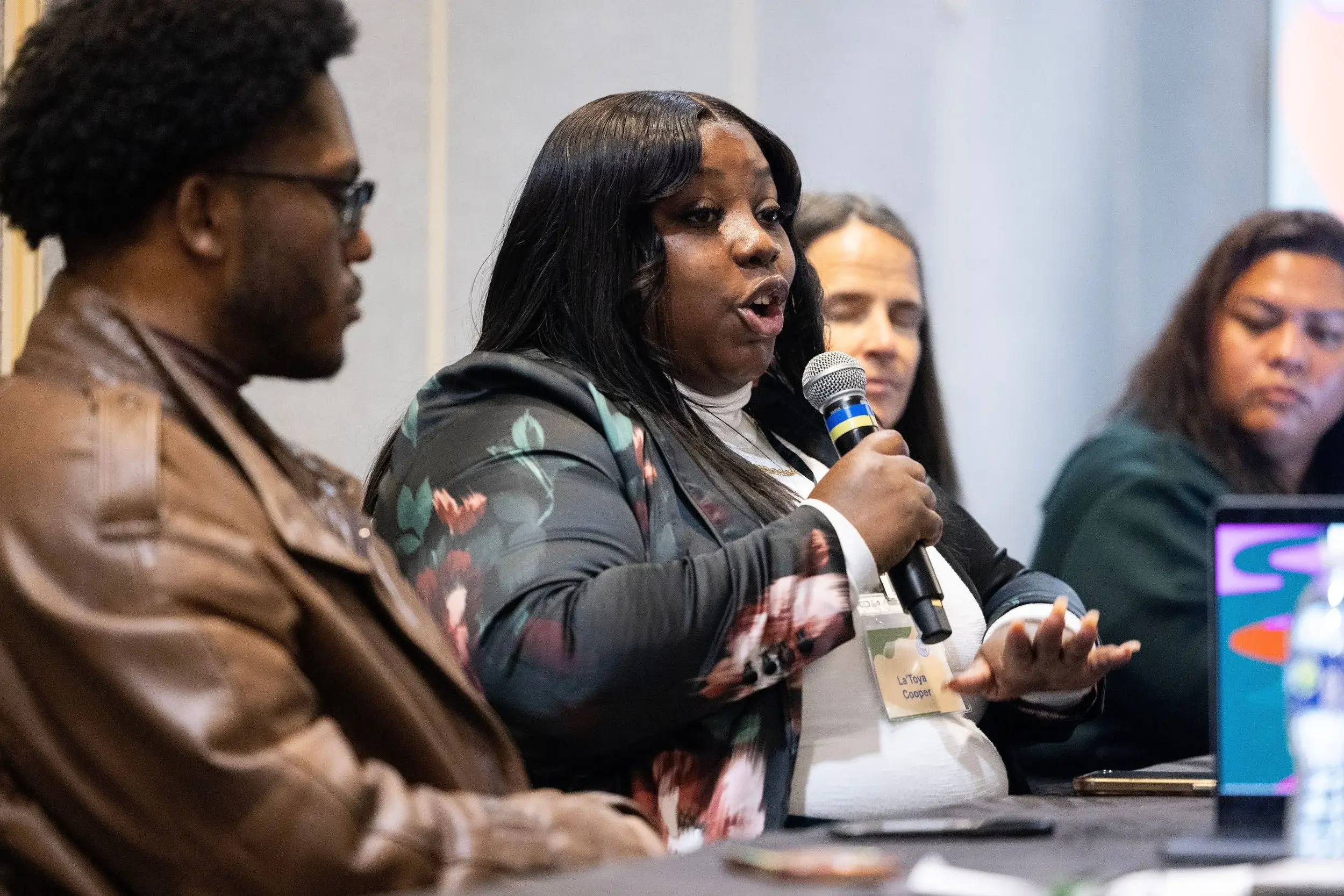
A new pilot program called CASH LA has launched in Los Angeles County, offering direct financial assistance to young people at imminent risk of homelessness. The initiative is a partnership between Point Source Youth, LA Emissary, and AMAAD Institute, with support from Cedars-Sinai and the Conrad N. Hilton Foundation.
Unlike traditional homelessness prevention programs that often focus on eviction cases or families, CASH LA takes a youth-centered approach designed specifically for people ages 18 to 30 who are on the verge of losing housing but are not yet unhoused. Participants create a personalized housing action plan with a trained provider and receive direct cash assistance to carry it out.
In a joint Q&A with the Los Angeles Blade, representatives from Point Source Youth, LA Emissary, and LA Emissary’s Young Adult Pooled Fund, including Larry Cohen, Leanndra Martinez, and Abby Gibson, shared their perspectives on the program. Organizers said CASH LA is the first program in Los Angeles to provide direct cash assistance to young people at imminent risk of homelessness while funding a personalized housing action plan. “Other programs have many requirements, are slow to implement, and youth, and especially LGBTQ identifying youth, do not access them,” they added.
For LGBTQ+ youth and youth of color, who experience homelessness at disproportionately high rates, CASH LA is designed to provide flexible support that meets their urgent needs. Organizers explained that the program “uniquely centers, responds, and funds what LGBTQ youth, youth of color, and LGBTQ youth of color need directly” while also addressing systemic barriers such as homophobia, transphobia, and the lack of affordable housing. “CASH LA gives young people the funds to be able to stay in their housing and allows them to utilize the funds for their identified needs,” they added.
Youth leadership is also embedded throughout the program. Members of the LA Emissary’s Young Adult Pooled Fund helped design and fund the initiative, from drafting proposals to selecting partners. “From start to finish, young adults are involved in every step,” organizers explained. “They decided to invest in direct cash transfers and collaborated with Point Source Youth to develop the RFP, review the proposals, and make decisions about which organization to fund.”
Direct cash transfers are at the heart of the model. Organizers said the approach works because it removes barriers and provides immediate resources for urgent housing crises. “If a young person is in a crisis that is going to lead to them experiencing homelessness, resourcing them to get out of that crisis with cash and support is what works,” they said. “Young people use the cash for housing, back rent, food, transportation, and the things they need to not enter the homeless system in the first place.”
The program’s impact will be tracked through surveys and data collection in partnership with Johns Hopkins University, measuring housing stability, financial well-being, and overall health. Early results from similar efforts in other states suggest high success rates. “Studies indicate that, with an average of 90 percent of respondents reporting they have achieved stable housing in the first 30 days, and looking at the Central Diversion Fund, that rate was over 90 percent in 12 months,” organizers said.
Critics of direct cash programs sometimes question whether youth will spend the money responsibly. Organizers rejected that notion, pointing to consistent research and outcomes. “When we trust young people to know what they need and then meet them where they are with the right support, we can prevent homelessness before it starts,” they said. “Young people use the resources responsibly, as part of their housing action plan, they work with a prevention specialist, and then, 90 percent of them do not enter the homelessness system. And it is cost-effective. What other programs can say that?”
As the pilot rolls out in Los Angeles, Point Source Youth is also working with funders to expand direct cash programs in ten communities nationwide. Locally, CASH LA is continuing to enroll participants until funds are fully distributed, with hopes that evidence from this pilot will pave the way for long-term investment.
“The most powerful lesson we have learned from youth is that we need more dedicated and flexible resources for young people,” organizers said. “We need to make sure all LGBTQ youth at risk of homelessness in LA have access to a program to effectively prevent them from experiencing homelessness in the first place.”
West Hollywood
West Hollywood’s Red Dress Day: a cocktail of queer euphoria, dance, and discontent
An organizer said it was “like pulling teeth” trying to raise funds
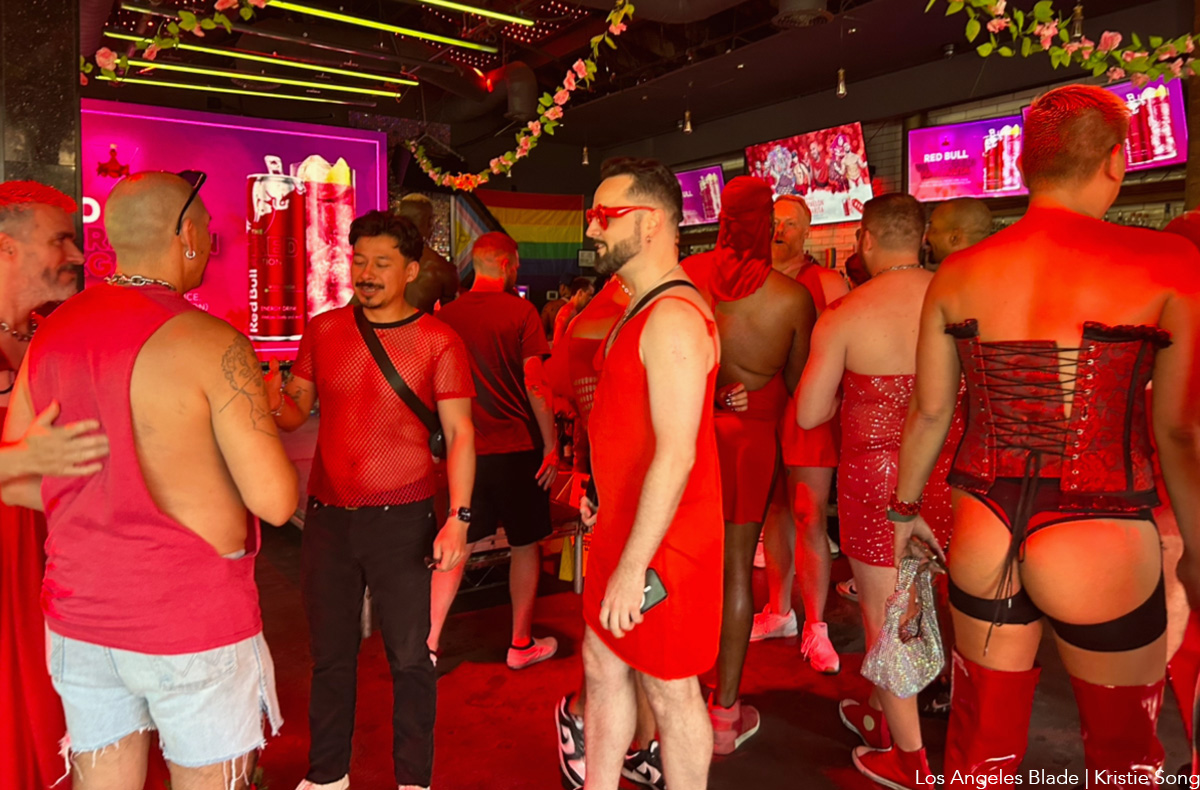
Red lights flooded the intimate space at Rocco’s WeHo Sunday night, as Anita Ward’s sultry 1979 disco hit “Ring My Bell” bewitched the dance floor. People clad in all-red leather outfits, dresses, mesh shirts, elegant gowns, and ruffled sleeves mingled and swayed their hips to the loud, thumping beat of funk-infused club classics. They were gathered together for West Hollywood’s annual Red Dress Day, a community fundraising event centering HIV/AIDS awareness.
Red Dress Day, also known as the Red Dress Party, is celebrated in cities across North America, and offers a space for new and longtime friends to commemorate the resilience of their communities, embrace queer joy, and raise funds for local organizations providing resources and services to individuals affected by HIV/AIDS.
At this year’s West Hollywood iteration, organizer and host Billy Francesca strutted in and out of the nightclub in tall black pumps, holding the end of a long red sequined dress in one hand and a microphone in the other. Throughout the evening, Francesca greeted attendees and urged them to purchase a red wristband, which would allow them access to community drink specials at Rocco’s and other nearby bars participating in the day’s festivities. The funds from these donations were to be donated to The Wall Las Memorias (TWLM), an organization dedicated to providing inclusive and culturally-competent HIV/AIDS care to underserved Latine communities.
TWLM offers HIV testing and counseling, peer-led support groups, consultations around health services and insurance coverage, as well as community programs and workshops around advocacy, health prevention and mental health destigmatization.
While excitement and dance was ripe in the air, there was also discontent behind-the-scenes.
As more and more people began to trickle into Rocco’s, only a few had purchased a red wristband. “Years ago, it was like: ‘Who needs what? How can we help? What can I do?’ Now it’s like pulling teeth,” Francesca told the Blade, frustrated at the lack of concrete donation support from attendees. “It’s disheartening, because the gay community wasn’t like this when I was coming up and out. People were just more there for each other.”
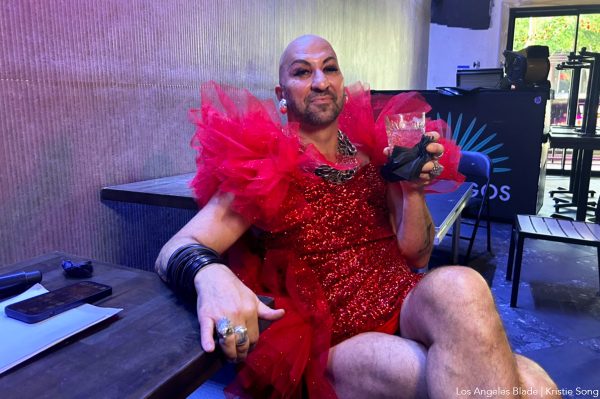
Francesca first began organizing for Red Dress Day in 2023, after the event had entered a hiatus through the pandemic. Moving forward, Francesca hopes to take a more background role in planning, stating that it’s become too much work for him. From rallying bars together and making sure drink specials were being properly distributed, to greeting attendees and making sure everything was running smoothly and on time, Francesca’s capacity has grown thin. “It just needs to be tightened up,” Francesa said, who is passing the gauntlet to Matthew Zaslow.
Zaslow, a Red Dress Day producer and founder of event planning agency Eventure Productions, is set to take on larger responsibilities for future Red Dress celebrations in West Hollywood. “I’m trying to make it a lot bigger,” Zaslow tells the Blade. “The big ones are San Diego and Palm Springs. So that’s my goal — in two or three years, to make it as big as that.”
As the event evolves, longtime attendees like Charlie McCrory are eager to continue to show up. It is an opportunity to band together in unabashed and free queer expression: to resist, to remember, and to hope. “We had to go through a lot to be here today,” McCrory told the Blade. “As a community, we’ve gone through a lot. And we need to remember that. We can’t forget it. And we need to relish, to celebrate.”
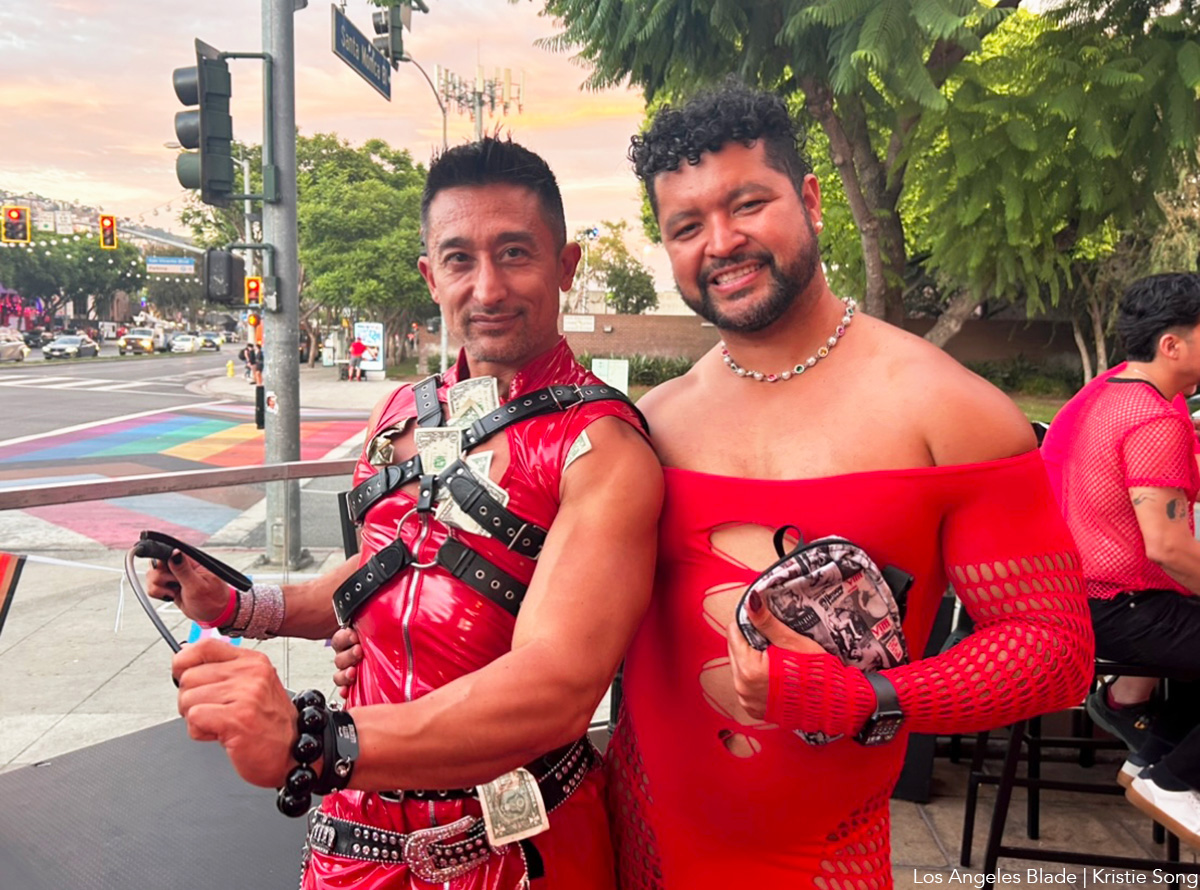
Los Angeles
The TransLatin@ Coalition campaigns for $20 million to support new housing initiative
If approved, the funds will go towards homelessness prevention
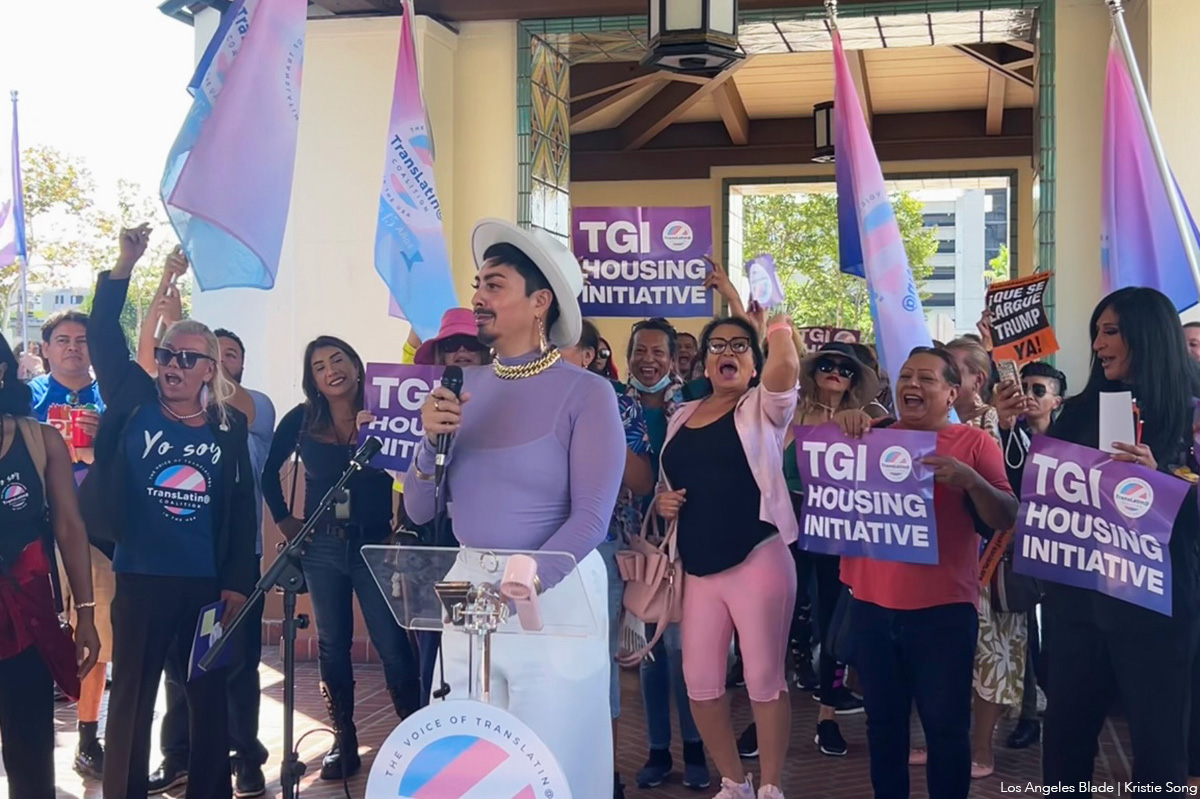
On Wednesday afternoon, over 50 people gathered in the heat outside the Metropolitan Water District. They waved large transgender pride flags and chanted at the top of their lungs: “Aquí está la resistencia trans!” Here is the trans resistance.
Leaders of the TransLatin@ Coalition (TLC), an organization formed by transgender, gender-expansive and intersex (TGI) Latine immigrants to support their fellow community members, led these jubilant calls for action at their press conference yesterday.
TLC organized this event to announce the launch of their new campaign, the TGI: Housing initiative. The group hopes to partner with the Los Angeles County Affordable Housing Solutions Agency (LACAHSA), an organization that was established in 2023 after the passing of SB 679: a bill aimed to increase affordable housing in the region.
What is TLC asking for? $20 million to invest into their communities. If approved, the funds would be allocated towards homelessness prevention resources like housing rental assistance and legal support clinics, specifically for TGI system-impacted individuals, seniors, transitional age youth, disabled community members and immigrants. “We are investing in people, not just programs,” said Queen Victoria Ortega at the press conference. Ortega is a chief visionary officer for the Connie Norman Transgender Empowerment Center.
“Housing is the foundation for opportunity,” Ortega continued. “When you are able to be in a safe, warm home, you’re able to take your medications. You’re able to take a respite. You’re able to think about the next step that you’re going to take. And really, why wouldn’t you want that for your neighbor? I end with saying: invest in trans lives.”
Authors of a June 2024 report published by the Williams Institute, a research center that informs public policy for LGBTQ+ communities, found that 47% of trans and nonbinary adults in the county live below 200% of the federal poverty level and face significant food insecurity and housing instability.
TLC is calling upon LACAHSA to utilize money from Measure A, a countywide half-cent sales tax that went into effect this April. The measure, meant to address the county’s homelessness crisis, generates over $1 billion annually and 33.75% of these funds are provided to LACAHSA. This amounts to over $380 million for the organization.
“Right now is the time for us to be invested in. We have a federal government who is trying to erase our existence,” said Bamby Salcedo, president and CEO of TLC, to the crowd. “That is why we’re calling on the LACAHSA board to commit to community engagement and partnership to ensure that this funding is community-led and that it is invested in all of us.”
Then, Salcedo led another chant. “Can we do it? When I say ‘People,’ you say ‘Power!’ People!” “Power!” Their voices carried like bells across the courtyard: a loud, clear and unbroken chorus.
As the press conference came to an end, TLC leaders encouraged community members to attend the LACAHSA board meeting happening right after, at 1 p.m. ChiChi Navarro, an active local advocate and a policy intern at TLC, explained how to make the most of their allotted minute during public comment. “Focus on your experiences,” said Navarro. “Focus on what you’ve gone through whenever you’ve tried to acquire housing. We understand that as a community, sometimes we’re affected simply for being who we are — and they need to listen to that. We are here in numbers so we won’t be silenced. Aquí está la resistencia trans!”
Many walked into the board room together at the Metropolitan Water District. Over ten community members took to the podium to share their personal experiences with homelessness, in both Spanish and English.
“As transgender, non-conforming and intersex individuals, we face unique challenges, especially those of us who are people of color, disabled or trans women who’ve experienced violence,” said Arianna Taylor, who was unhoused for three years. “$20 million allocated for TGI housing represents more than just funding. It represents hope, dignity and safety for people who, like me, have been forced to navigate a world of violence, stigma and exclusion.”
As Salcedo and her fellow TLC staff wait to hear more updates from LACAHSA, they will return to their work: empowering their community. “I’m really grateful that people are understanding that they have to advocate for themselves,” Salcedo told the Blade. “It is important for us to speak about what our needs are, and also try to find a solution. And please do come to our organization and see how we can support you.”
West Hollywood
“Will you own your deceit?” West Hollywood community members denounce city’s decision to lower flags for Charlie Kirk
Local residents packed last night’s city council meeting to voice their anger
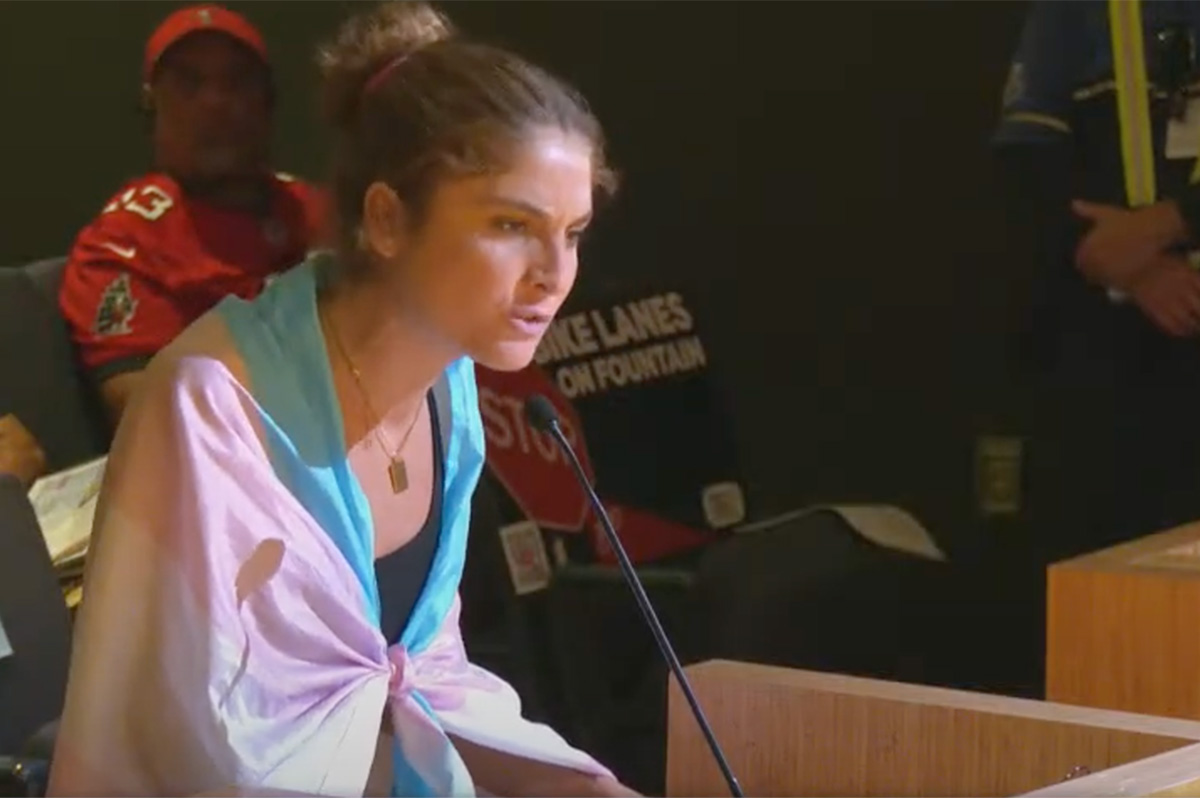
On Monday evening, West Hollywood residents packed the city’s council chambers ahead of the city council meeting. When the room opened up for public comment, several people loudly voiced their upset at the city’s decision to uphold President Trump’s recent proclamation, which ordered that U.S. flags at all public buildings and grounds be lowered to half-staff for four days following the death of Charlie Kirk.
Kirk was killed on Wednesday, September 10th, and was a prominent right-wing political activist, public speaker, and social media figure who gained popularity by participating in political debates with college students that were shared across YouTube, Instagram, and TikTok. He founded Turning Point USA in 2012, an organization dedicated to spreading conservative ideologies amongst young people. With over 18 million followers across Instagram and X, Kirk often took to the internet to share his anti-LBGTQ+ stances. He opposed same-sex marriage, called the need for gender affirming care a “mental disorder,” and supported the burning of Pride and Black Lives Matter flags.
When West Hollywood, a city that has long been home to much of the county’s LGBTQ+ communities, complied with the proclamation to honor Kirk’s death — community members were outraged.
Local resident Shannon Axe took the podium at last night’s meeting and called the decision “devastating.” She spoke of her own experience as a transgender woman, and how she is dedicated to supporting trans youth in an increasingly difficult social climate. “For me and for many others, these flags are not just fabric. They are a lifeline,” Axe continued, as applause reverberated around the room.
“They tell us ‘you are safe here. You are valued here. You belong here.’ To lower them in recognition of someone who has denied our humanity felt like erasing our dignity.”
Another community member, Nik Roybal, read from a poem they wrote in light of the city’s recent action. “Government, will you own your deceit? Government, will you witness our hurt, pain, anger, sadness? Why did you lower the flags for a terrorist, a white Christian nationalist?” Roybal recited. “This flag, this brown body, will not be lowered for a terrorist who wanted me and our siblings dead. Not in our name. To a city and a people that I love — not in our name.”
After public comment concluded, city manager David Wilson echoed a sentiment from the city’s official statement: that the City’s decision to comply with the presidential proclamation was not an endorsement of Kirk’s beliefs. Rather, it was following city protocol and United States Code.
But, Wilson clarified, that even traditional customs like this should be subject to more complex consideration if they present harm to local community members. “Thoughtful consideration should be taken to update this policy,” Wilson said. “I acknowledge that this decision has caused pain and frustration for many people in our community.”
Updates to the city’s flag policy will be discussed at the October 20 city council meeting.
Los Angeles
LGBTQ+ proponents respond to “devastating” Supreme Court ruling
Supreme Court allows “unlawful” immigration operations to continue

Since June, federal agencies began conducting mass immigration operations in Los Angeles and other major cities. For just as long, local residents, leaders, and advocacy groups have challenged their arrest and detainment practices, citing that their methods have violated constitutional rights.
In July, individual workers were joined by organizations like the Los Angeles Worker Center Network and the Coalition for Humane Immigrant Rights in filing a lawsuit against the Department of Homeland Security (DHS), arguing that federal agents had been illegally arresting people based on their perceived race, language and work — a violation of the Fourth Amendment.
As a result, two temporary restraining orders were issued, barring federal agents from stopping individuals without reasonable suspicion. DHS was also ordered to provide access to legal counsel for detainees.
On Monday, the Supreme Court voted to end this and granted the federal government’s application for a stay — or pause — of the temporary restraining orders. This will allow immigration operations to continue, and how they will proceed worries local leaders.
“This Supreme Court ruling strikes at the heart of who we are as a nation—allowing immigration agents to stop and detain people for little more than speaking Spanish or having brown skin,” wrote District 51 Assemblymember Rick Chavez Zbur, a longtime advocate for LGBTQ+ civil liberty. “This endangers our communities, undermines our democracy, and erodes constitutional rights.”
Some city officials hope to continue providing resources and support to affected community members. “As the raids were taking place across the region and in our own City, we took immediate action to ensure there are adequate resources to care for and support immigrants and their families,” wrote West Hollywood mayor Chelsea Byers. “This work will continue.”
West Hollywood was one of several Los Angeles county municipalities that filed a motion to intervene in the ongoing lawsuit, calling for the court to stop the federal government from conducting unlawful stops and searches that were based on assumed race and not on probable cause. It also activated its West Hollywood Responds program to raise awareness on available services like legal toolkits and training, consultations, access to free meals and more.
Local organizations are also extending their support. “The Supreme Court’s ruling is a devastating setback for Latine and immigrant communities, especially LGBTQ+ people who already face immense barriers to safety and belonging,” wrote Terra Russell-Slavin, the Los Angeles LGBT Center’s chief strategy officer. Russell-Slavin explained that the center has expanded free legal clinics both virtually and throughout the city to provide Know Your Rights workshops and other immigration and asylum support services.
“You are not alone,” Russell-Slavin continued. “And the Center will continue to stand with you.”
On September 24, the federal district court will hold a hearing to consider additional evidence and a possible preliminary injunction that will pause this most recent ruling.
Kristie Song reports for the Blade courtesy of the California Local News Fellowship
West Hollywood
Holloway Kitchen: Turning West Hollywood’s former IHOP into a hub for queer resilience and opportunity
Holloway Kitchen turns a vacant West Hollywood IHOP into a training hub for unhoused, queer, and immigrant residents, providing skills, jobs, housing support, and a voice in shaping systems that have long failed them.
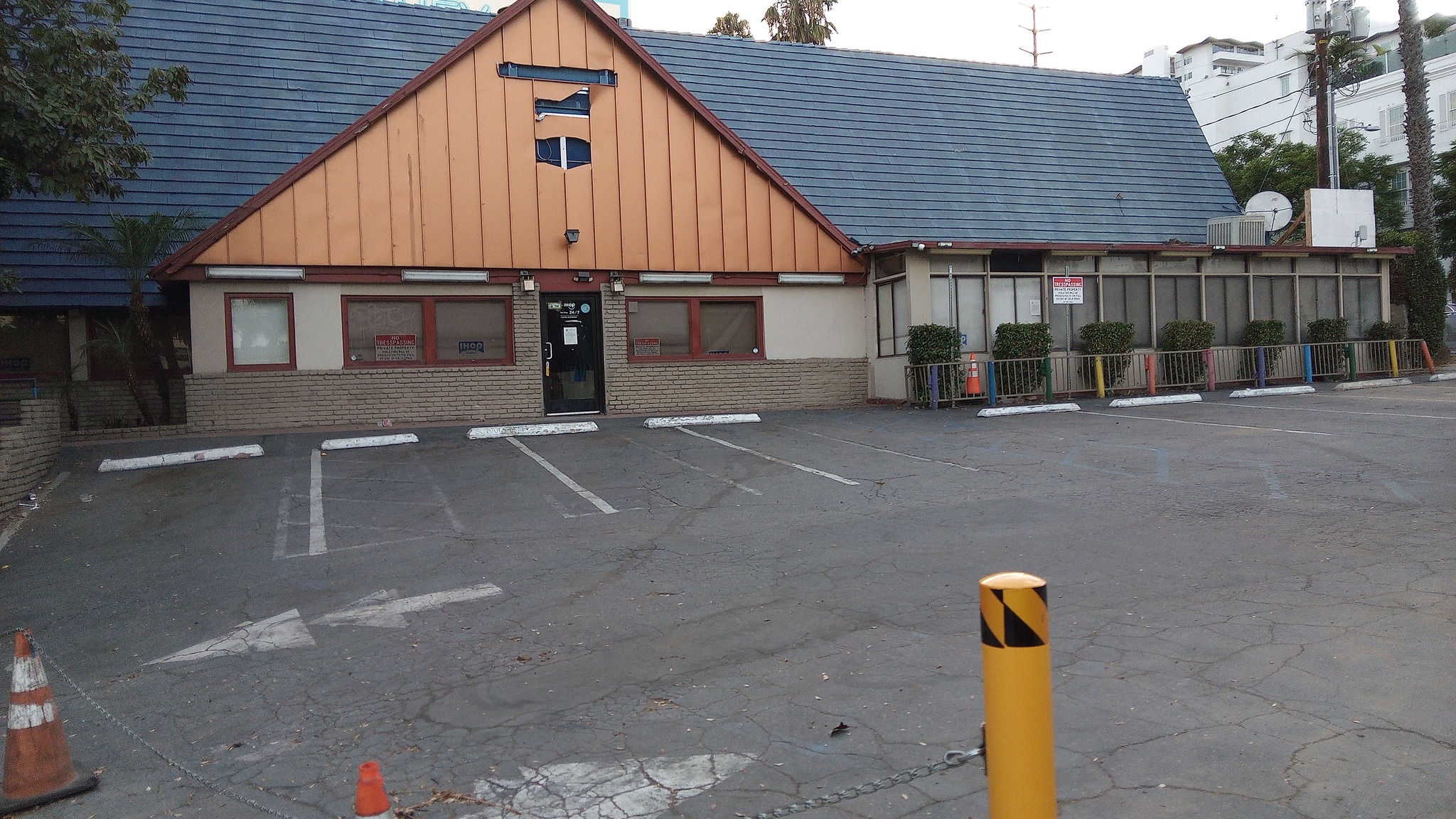
Homelessness in Los Angeles is not the result of personal failure. It is a predictable outcome of systemic inequities that push people to the margins while wealth and power concentrate elsewhere. Queer and immigrant communities often carry the heaviest burden. West Hollywood, long a site of queer resistance and organizing, now faces that crisis at its doorstep.
A new initiative, Holloway Kitchen, aims to respond. Proposed by Holloway Housing, the project would transform the long-vacant IHOP at 8461 Santa Monica Boulevard into more than a restaurant. It is designed as a community hub where food becomes a vehicle for structural change—offering training, jobs, and support to unhoused residents in West Hollywood.
“Holloway Kitchen is about dignity and empowerment,” said Jerry Soper III, founder of the project. “We are not just opening a restaurant; we’re creating pathways for people to build stability while being part of a community.”
The project is intended to work with residents of the nearby Holloway Interim Housing Program, managed by Ascencia, providing culinary and hospitality training through a proposed 12-week program. Graduates could secure jobs at Holloway Kitchen itself or with local partners such as SUR Restaurant, The Abbey Food & Bar, Mother Wolf, and the Hollywood Food Coalition.
Central to the vision is a commitment to those who face the steepest barriers. “LGBTQ+ youth face a 120% higher risk of homelessness,” Soper explained. “In Los Angeles, transgender individuals make up a significant portion of unsheltered populations. Holloway Kitchen aims to address these barriers with tailored support, flexible schedules for transition-related needs, and advocacy for queer youth facing housing discrimination.”
The restaurant itself would embody that same commitment to safety and affirmation. Plans include gender-neutral restrooms, a zero-tolerance harassment policy, and comprehensive LGBTQ+ sensitivity training for staff, in partnership with The Trevor Project and the Los Angeles LGBT Center. “We want every person who walks into Holloway Kitchen—whether as a trainee, employee, or customer—to feel affirmed and welcome,” Soper said.
Equally important, unhoused people will have a voice in shaping the project. Soper has convened an advisory board of Holloway House residents and alumni, including queer youth, immigrants, and trans women, to guide decisions on training, housing partnerships, and workplace culture.
Holloway Kitchen also seeks to honor West Hollywood’s legacy of queer organizing. “This project is inspired by the AIDS crisis response, when the community rallied to provide care, advocacy, and support,” Soper explained. Planned educational displays and events will highlight queer pioneers and the city’s history of resilience, blending historical reverence with forward-looking innovation.
The project is currently seeking $825,000–$1,075,000 in startup funding for renovations, staffing, and equipment, with a goal of opening in 2026. While the vision is ambitious, the City of West Hollywood underscored that it remains in the proposal stage. “The proposer has not, to date, been connected to the City, its service providers, or the property owner regarding this idea, and establishing these connections is a necessary prerequisite to consideration,” said Joshua Schare, City spokesperson. “We welcome the proposer to reach out to the City’s Human Services Division to discuss it further.”
Soper envisions the impact for participants: “In a year, a young queer person who comes to us with no job and no home could be thriving with stable employment, safe housing, and a support network. They would feel empowered to give back, becoming part of West Hollywood’s legacy of resilience.”
If successful, Holloway Kitchen could become a replicable model for addressing homelessness at the intersections of queerness, poverty, and immigration—providing a community-driven path toward opportunity where systems have historically failed. For now, it stands as a proposed initiative that seeks to reclaim power, restore dignity, and prove that survival is possible through solidarity and hope.
Palm Springs
Be Heard: Palm Springs Pride moves forward in 2025, celebrating resilience and resistance
Despite a $325K sponsorship shortfall, Palm Springs Pride presses on, celebrating LGBTQ+ resilience, community power, and the enduring spirit of resistance.
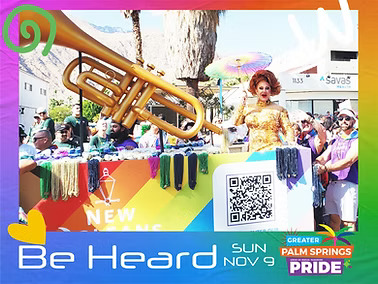
Despite facing a $325,000 shortfall in sponsorship funding, Greater Palm Springs Pride is pressing forward with its annual four-day celebration, which draws more than 200,000 attendees and generates millions in local economic impact.
“In our specific case, 60% of our shortfall is from one sponsor in Florida where the governor has directed a pullback from supporting DEI or related programs. The other 40% is a sign of economic times,” said Ron deHarte, President of Palm Springs Pride. “Partners who have and continue to support Palm Springs Pride are experiencing tighter budgets… we are confident good partners will continue their investment in our programming.”
The funding gap underscores how critical LGBTQ+ organizations are to their communities. DeHarte noted that these groups provide services ranging from crisis intervention for homeless youth to HIV/AIDS prevention, legal aid, and safe spaces. “When funding is cut or becomes unreliable, these vital services are put at risk. This not only undermines the organizations themselves but also directly impacts the well-being and safety of the individuals they serve. This financial pressure can be seen as a modern tactic of marginalization,” he said.
But this challenge is part of a much longer history of resilience for the LGBTQ+ community. “The history of Pride is fundamentally a story of resistance. From the Stonewall Uprising’s response to police harassment and brutality, the LGBTQ+ community has always had to fight for its right to exist openly and without fear… the collective pushback against legal, social, and political forces that have sought to push LGBTQ+ people to the margins defines what the LGBTQ+ movement has represented for the last 50 years,” deHarte said.
For deHarte, the shortfall is also a testament to the LGBTQ+ community’s ingenuity and self-reliance. “We are not victims. The LGBTQ+ community has a long history of fighting for its rights… The decision to proceed with Palm Springs Pride, even with fewer resources, is a testament to this spirit of self-reliance and strength. We have fought for everything we have. The rights and freedoms celebrated at Pride were not given freely; they were earned through decades of activism, advocacy, and sacrifice,” he explained.
“We do what needs to be done with the resources available. This year’s event will highlight the ingenuity and resourcefulness of the LGBTQ+ community. When faced with a lack of corporate sponsorships, grassroots support and community donations will fill the void. This underscores the idea that the community’s power comes from within, not from external validation or funding. We do more with less,” deHarte said.
Even with fewer resources, organizers say the festival will remain bold, inclusive, and unapologetically political. “It is vital that we stand together and show the world that our community is strong and our fight for equality continues. This year, more than ever, Palm Springs Pride will be a vibrant and political statement and a call to action that will not be quieted,” he added.
From its roots in grassroots protest to today’s massive celebration, Palm Springs Pride demonstrates the power of community, the resilience of a movement, and the enduring spirit of resistance — proving that Pride is not just a party, but a declaration: the fight for equality continues, and the LGBTQ+ community will not be silenced.
Those who want to support the festival can make a contribution online or participate in events like the Equality Walk, though attendance remains free to all.
You’ve linked the shortfall to the current political climate. When we look at the far-right media pipeline, it feels like they’re creating a lot of noise — but does that reflect reality on the ground?
In our specific case, and we point out every Pride organization is unique, 60% of our shortfall is from one sponsor in Florida where the governor has directed a pullback from supporting DEI or related programs. The other 40% is a sign of economic times. Partners who have and continue to support Palm Springs Pride are experiencing tighter budgets. They have been supportive in the past, are continuing to be supportive today. We are confident good partners will continue their investment in our programming.
Corporations seem to react quickly to that noise, often pulling back support out of fear. Do you see that as a reflection of real public opinion, or more about how power operates in boardrooms and newsrooms?
We have heard of this happening with some very large Pride organizations across the country. But when you step back and look at the 450-500 Pride events in the United States, a very small percentage of those events have experienced the corporate retreat you mention.
Pride was born as resistance to systems of power that wanted us silent. How do you see this year’s funding shortfall fitting into that longer history of LGBTQ+ people being pushed to the margins? Has the resistance ever changed?
The history of Pride is fundamentally a story of resistance. From the Stonewall Uprising’s response to police harassment and brutality, the LGBTQ+ community has always had to fight for its right to exist openly and without fear. The root of the struggle has been about individual rights; however, the collective pushback against legal, social, and political forces that have sought to push LGBTQ+ people to the margins defines what the LGBTQ+ movement has represented for the last 50 years.
In this context, the recent funding shortfall for LGBTQ+ organizations is a deeply concerning development that fits into this long history of marginalization. It is a modern form of the same pressure that has historically been used to silence and undermine the community.
The struggle for equality continues. Funding shortfalls for LGBTQ+ organizations represents a new front in this ongoing battle. These organizations are critical, providing a range of essential services for crisis intervention for homeless youth, healthcare access and HIV/AIDS prevention, legal aid for discrimination cases and community centers that provide safe spaces. When funding is cut or becomes unreliable, these vital services are put at risk. This not only undermines the organizations themselves but also directly impacts the well-being and safety of the individuals they serve. This financial pressure can be seen as a modern tactic of marginalization, as it seeks to weaken the infrastructure that the LGBTQ+ community relies on to advocate for its rights and support its members.
The funding shortfall is not just a financial issue; it’s an issue of social justice. It highlights the continued need for vigilance and support to ensure that the progress made by the LGBTQ+ community is not rolled back.
Corporate sponsorship often comes with strings attached and can vanish in the face of political pressure. What does it take to build support that is unshakeable, rooted in actual community power rather than optics?
What sponsorship support comes with no strings attached or no risk of future investment? Grants have deliverables and restrictions, city government funding is dependent on political support, businesses want logo exposure / tickets/ recognition, and now federal grants require removal of any transgender language. One would think individuals would freely donate to their local Pride but many view Pride as a party. It would be great for individual donors to replace the funds currently provided by large money sponsors. While many Pride events are free to attend, implementing small fees for certain aspects can generate significant revenue. Tickets for specific concerts, reserved seating for the parade, or fundraisers throughout the year are also ways to shift the funding model. These are all opportunities. We need to do a better job letting the community know how they can support.
Is it fair to say that relying on corporations has sometimes weakened Pride’s political edge? How do you balance funding needs with staying true to a movement built on resistance?
In our case we have never tempered the political nature of Pride in Palm Springs. However, we have experienced parade participants pulling out because they feel the parade is too political.
What role do you see for small businesses, local organizers, and everyday community members in sustaining Pride, especially when big sponsors pull out?
For free Pride events like Palm Springs Pride, attendees can help by donating $10 bucks (or more) online in place of buying a ticket. Many small businesses who are able already support Pride. However, there are many others who benefit from the economic impact a Pride event has in the community who choose not to provide support. Our message is that we welcome everyone, we are a free event and donations are appreciated to cover expenses.
Systems of power that target queer people are also targeting immigrants, BIPOC communities, and other marginalized groups. How do you see Pride standing in solidarity across those struggles?
We are immigrants. We are the BIPOC community. While Palm Springs is widely known as a welcoming and inclusive city for the LGBTQ+ community, groups within the community face additional layers of marginalization. These groups often experience unique challenges due to the intersection of their LGBTQ+ identity with other identities, such as race, age, and disability. We are one and must ensure TGI individuals, LGBTQ+ people of color, youth, older adults and individuals with disabilities are at the table.
Are there lessons from mutual aid and grassroots organizing that could reshape how Pride operates — making it more of a real support network, not just a festival?
Yes, the origin of Pride is in grassroots organizing and protest. While the modern landscape includes celebratory elements and corporate involvement, look behind the curtain, and one will see its core purpose remains a powerful blend of community building, activism, and providing a crucial support network for LGBTQ+ people. That’s grassroots in 2025. In Palm Springs, it is, and always has been, more than just a party. Pride is fundamentally a real and vital support network for the LGBTQ+ community.
At a grassroots level, Pride provides a space for LGBTQ+ individuals to be their authentic selves without fear of shame or stigma. This visibility is powerful, especially for those who may feel isolated in their daily lives. Pride events, and the organizations behind them, connect people with a “chosen family” and a sense of belonging. Pride continues to be a call to action. It raises awareness about ongoing struggles for equality and rights, and it is a powerful opportunity for protest and political mobilization.
Looking back at the history of Pride as a movement born from resistance, does this funding crisis feel like an opportunity to recenter the movement on community accountability, activism, and care networks rather than corporate sponsorship?
This is certainly a time to ensure our platform reignites the Pride experience to demand rights, protest injustice, and raise awareness about ongoing struggles of the community. The current funding crisis, while difficult, presents a chance to fortify the movement from the ground up, ensuring it remains a powerful force for advocacy and community care, rather than a perceived corporate-sponsored spectacle. It is vital that we stand together and show the world that our community is strong and our fight for equality continues. This year, more than ever, Palm Springs Pride will be a vibrant and political statement and a call to action that will not be quieted.
What would you say to those watching from outside the LGBTQ+ community? What message does Palm Springs Pride send by moving forward this year despite these setbacks?
To those watching from outside the LGBTQ+ community, Palm Springs Pride sends a powerful and unwavering message. It is a message of resilience, determination, and a refusal to be silenced. By moving forward this year despite recent funding shortfall due to a challenging political climate, Palm Springs Pride is showing our commitment is not conditional on easy circumstances. We are demonstrating that Pride is more than a party; it is a fundamental act of visible existence, a celebration of hard-won rights, and a continued protest against injustice.
We are not victims. The LGBTQ+ community has a long history of fighting for its rights. From daily struggles for equality, the community has always had to create our own path forward. The decision to proceed with Palm Springs Pride, even with fewer resources, is a testament to this spirit of self-reliance and strength. We have fought for everything we have. The rights and freedoms celebrated at Pride were not given freely; they were earned through decades of activism, advocacy, and sacrifice. This year’s events serve as a reminder of this ongoing struggle and honors the pioneers who paved the way.
We do what needs to be done with the resources available. This year’s event will highlight the ingenuity and resourcefulness of the LGBTQ+ community. When faced with a lack of corporate sponsorships, grassroots support and community donations will fill the void. This underscores the idea that the community’s power comes from within, not from external validation or funding. We do more with less. The ability to adapt and thrive in the face of adversity is a defining characteristic of the LGBTQ+ community. Palm Springs Pride’s continued existence despite a budget reduction shows that the core message and purpose of the event are not dependent on a lavish production. The focus remains on community, activism, and a powerful, visible presence.
Palm Springs Pride Celebration 2025 / Thur Nov 6 through Sun Nov 9 FREE ADMISSION
-
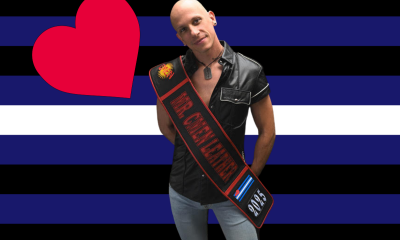
 Features4 days ago
Features4 days agoHarnessing identity: Mr. CMEN Leather 2025 bares his heart and soul
-

 Los Angeles2 days ago
Los Angeles2 days agoTrans and nonbinary immigrants experience greater levels of poverty, new report finds
-
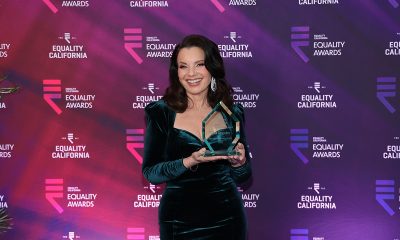
 Events4 days ago
Events4 days ago“We are glimmers of hope”: LGBTQ+ advocates deliver powerful speeches defending queer rights at Equality Awards
-
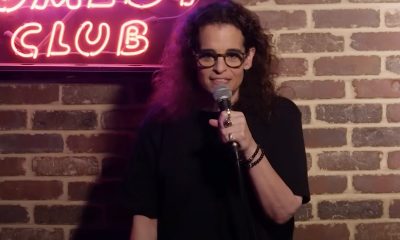
 Celebrity News3 days ago
Celebrity News3 days agoLesbian comedian who performed in Saudi Arabia apologizes
-
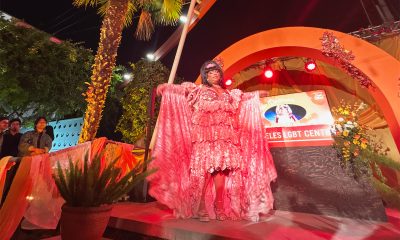
 Events3 days ago
Events3 days ago“Butterflies are free. Humans deserve to be free too.” Queerceañera honors local queer Latine community
-

 Miscellaneous4 days ago
Miscellaneous4 days agoTiffany ‘New York’ Pollard Dishes on queer storytelling in her new show ‘Slayers: Wheel of Fate’
-

 National3 days ago
National3 days agoLGBTQ rights on the line: What to watch as Supreme Court’s new term begins
-
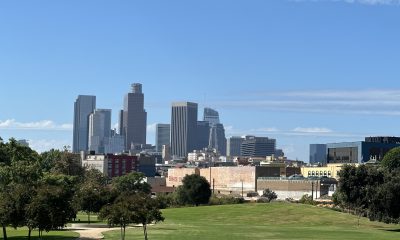
 Parks & Recreation3 days ago
Parks & Recreation3 days agoL.A. residents remain hopeful for a park life that reflects the needs of its inhabitants
-

 Miscellaneous2 days ago
Miscellaneous2 days agoEscaping the party culture: Why more LGBTQ+ people are choosing sobriety and utilizing ketamine therapy
-

 a&e features1 day ago
a&e features1 day agoJennifer Lopez talks ‘Kiss of the Spider Woman,’ queer representation

